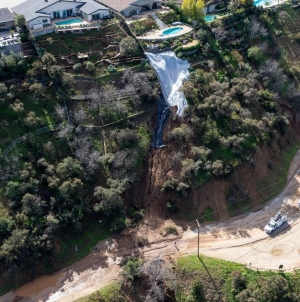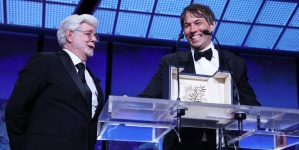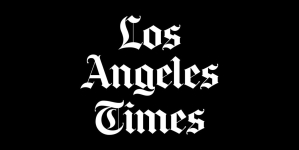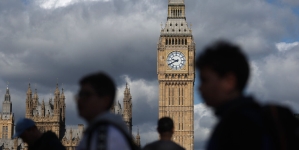-
12 days that rocked USC: How a derailed commencement brought ‘total disaster’ - April 27, 2024
-
A portion of Mulholland Drive, damaged by mudslides in winter storms, reopens - May 26, 2024
-
‘Maybe You Don’t Want to Win’ - May 26, 2024
-
Donald Trump Putting Law Enforcement in Danger: Attorney - May 26, 2024
-
Avoid the waters of these 5 L.A. County beaches this holiday weekend, public health officials say - May 26, 2024
-
Bawdy Comedy ‘Anora’ Wins Palme d’Or at Cannes Film Festival - May 26, 2024
-
Map Shows Heat Wave Zone Spread Into Five New States - May 26, 2024
-
Azusa police arrest suspected slingshot-wielding vandal - May 25, 2024
-
Donald Trump Hammers Judge Ahead of Jury Instructions - May 25, 2024
-
Sometimes U.S. and U.K. Politics Seem in Lock Step. Not This Year. - May 25, 2024
12 days that rocked USC: How a derailed commencement brought ‘total disaster’
The crowning of Asna Tabassum as USC valedictorian was supposed to be a time of pride for a university that has tried to shed its old image as a playground for the privileged by bolstering academics and diversity.
In selecting Tabassum from close to 100 applicants with near-perfect GPAs and impressive extracurriculars, USC put the spotlight on a hijab-wearing Muslim daughter of Indian immigrants for its highest undergraduate honor.
A biomedical engineering major with a passion for social justice who minored in “resistance to genocide,” she was just the kind of student USC has aimed to attract and has celebrated in ads for the university, where the annual tab for those without scholarships or financial aid this fall will eclipse $95,000.
Instead, the decision by President Carol Folt to rescind Tabassum’s graduation speaking slot after undisclosed threats has catapulted USC into almost two weeks of protest and controversy. The campus gates are closed to the public, police have made 93 arrests, many classes were moved online, and the marquee 65,000-attendee “main stage” commencement ceremony has been called off.
Even at a time when swelling demonstrations have engulfed campuses across the nation, USC stands out. No other university has pulled its main commencement, and few have seen as many arrests as quickly as USC.
“It’s a complete disaster,” said Viet Thanh Nguyen, a bestselling novelist and university professor of English, American studies and ethnicity and comparative literature who has taught at USC for 27 years. “In every option, our administration has chosen the worst option. Every step along the way, our administration has been absent.”
Gabriel Kahn, a USC journalism professor, had a similar view.

Pro-Palestinian demonstrators at USC.
(Brian van der Brug / Los Angeles Times)
“What I have wanted to see from the beginning of this is for the university to exhibit some leadership and convene an uncomfortable conversation where differing points of view confront one another in the spirit of dialogue and learning,” he said. “Instead, we’ve seen an effort to flee from anything remotely controversial, which I think is intellectual cowardice.”
On Friday, Folt — who until then had not commented publicly on the recent events — released a letter to students, faculty and staff, saying that “the past few weeks have been incredibly difficult for all of us” and that “the current pressures and polarization have taken a toll in ways that break my heart.” Folt called on the USC community to “share points of view, listen, search for common ground — and find ways to support each other.”
In an email, Lauren Bartlett, associate vice president for strategic and crisis communications, declined a Times request to interview Folt. The USC board chair, Suzanne Nora Johnson, also declined an interview request. Tabassum, who previously spoke to The Times, did not reply to a subsequent interview request.
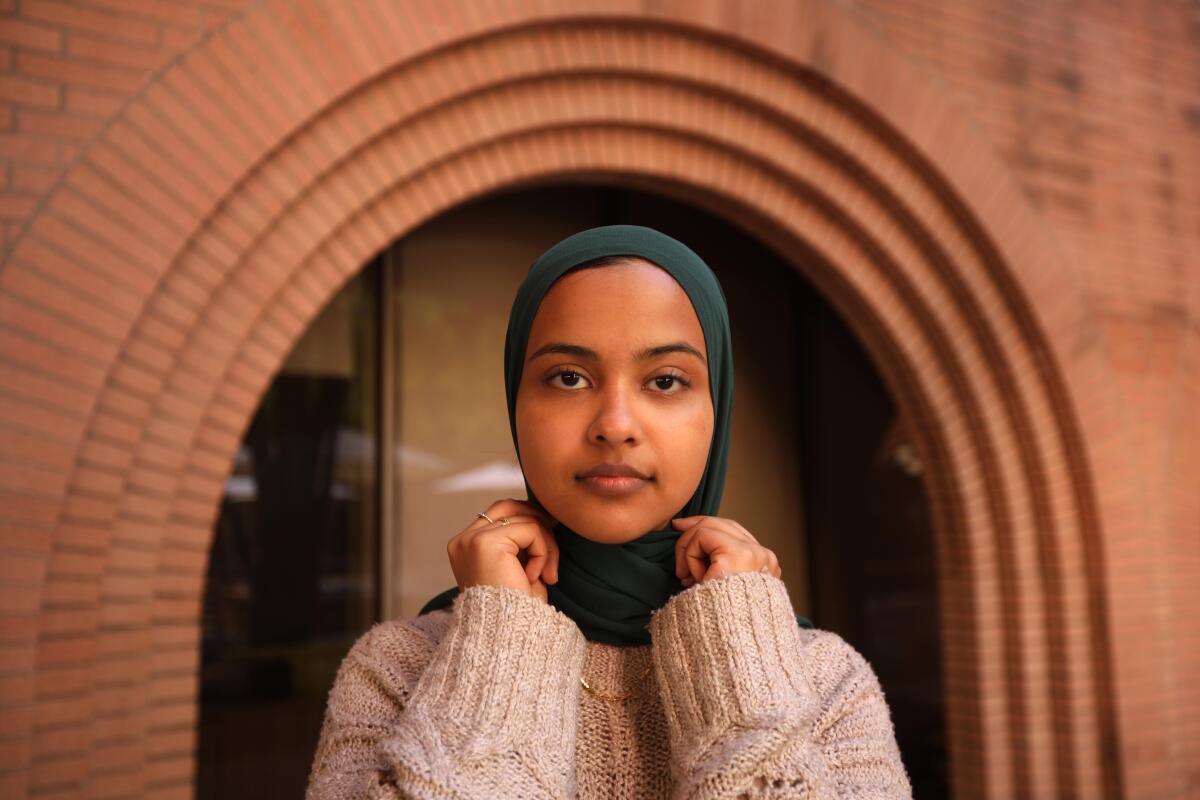
Asna Tabassum, USC’s 2024 valedictorian, whose commencement speaking invitation was canceled, triggering waves of protest.
(Genaro Molina / Los Angeles Times)
The seeds of the USC crisis were sown in March when Provost Andrew T. Guzman notified Tabassum that she was valedictorian. Her reward: joining the “main stage” commencement on May 10 to give a 3-to-5-minute address.
On April 2, Folt and Guzman took part in an Academic Honors Convocation in a campus ballroom with Tabassum and others.
“I’m looking at a roomful of multi-hyphenates,” Folt said, according to USC Today, which featured a group picture of the smiling president with Tabassum behind her in a light green hijab. Folt said students inspired her because they were “expanding that personal search for meaning to include something very important: benefiting humanity.”
Pro-Israel groups quickly seized on Tabassum’s selection, accusing the university of caving to antisemitism.
“What will she say at the podium?” said an April 9 Instagram post by groups including We Are Tov and Israel War Room that went viral.
The complaints centered on a pro-Palestinian link on Tabassum’s Instagram profile. The link to a “Free Palestine” site said, “Zionism is a racist settler-colonialist ideology.” It added that “one Palestinian state would mean Palestinian liberation and the complete abolishment of the state of Israel” so that “both Arabs and Jews can live together.”
Six days later, on April 15, USC announced that Tabassum would no longer appear on the commencement stage, citing security concerns. The university has not provided more details about the nature of the threats, and the LAPD said it had not received reports of threats to Tabassum or the commencement.
In an interview at the time, Guzman, the provost, said Folt was not behind the decision to cancel the speech. A day later, Joel Curran, USC’s senior vice president of communications, contradicted Guzman, saying the final decision was indeed the president’s.
Some faculty, administrators and parents of students questioned why the selection process did not include vetting of social media. Although the provost cited “the expectations of federal regulators” in explaining why Tabassum’s speech was canceled, many faculty saw a clear desire to prevent the type of congressional hearings on antisemitism that wrought havoc for the presidents of Harvard, Columbia and the University of Pennsylvania.
“It’s part of larger crises in academia,” said Nguyen. “Universities are under a right-wing attack.”
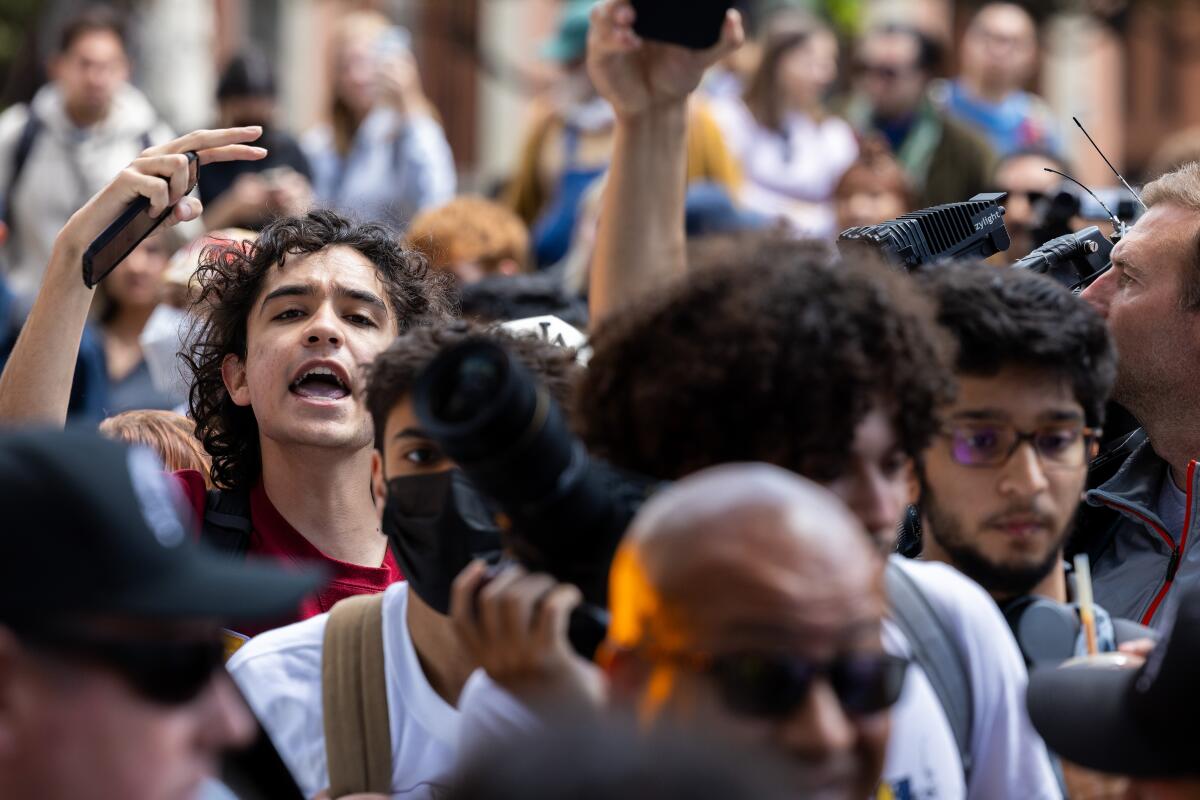
Pro-Palestinian demonstrators at USC on Wednesday.
(Brian van der Brug / Los Angeles Times)
By April 18, hundreds were marching on campus in support of Tabassum’s stated belief that she was being “silenced” for her race, religion and political views. Tabassum said in an interview that she had no plans to directly address the Israeli-Palestinian conflict at graduation but wanted to talk about “hope.” She said she is not antisemitic and had never publicly been an activist for the pro-Palestinian cause.
On April 19, the “main stage” commencement was diminished further when the university canceled an address by director Jon M. Chu of “Crazy Rich Asians.” It also nixed the awarding of honorary degrees at the ceremony to recipients including tennis star Billie Jean King.
Curran said the university didn’t want to put outside guests in an “awkward situation” where they would feel pressured to speak out about Tabassum or take sides in the Israel-Hamas war.
A spokeswoman for the USC School of Cinematic Arts, which helped recruit Chu, cited “security concerns.”
Tensions were mounting. The ACLU and the Council on American-Islamic Relations had gotten involved, offering assistance to Tabassum. The USC Chabad Jewish center called out the university for blaming security while accusing it of failing to address questions of antisemitism head-on in a time of rising anti-Jewish hatred.
The events also tore at precarious bridges built between Muslims and the administration after student complaints in recent years of anti-Muslim bias on campus.
Members of the Advisory Committee on Muslim Life at USC — made up of students, faculty and staff — wrote to Folt, asking her to reconsider the Tabassum decision by April 19. When they said they did not hear back, more than half the members resigned.
“It is a bewildering time,” said Aisha Patel, a graduate student in communication studies who was among those who resigned. “I hope this is the tipping point of true change and that the administration starts listening and having deep conversations.”
The next night, Folt appeared at a $550-per-person alumni gala at a Fairmont Century Plaza ballroom. In a brief address, she recognized attorney, investor and philanthropist Charles Griffin Cale, who was awarded USC’s highest alumni achievement prize.
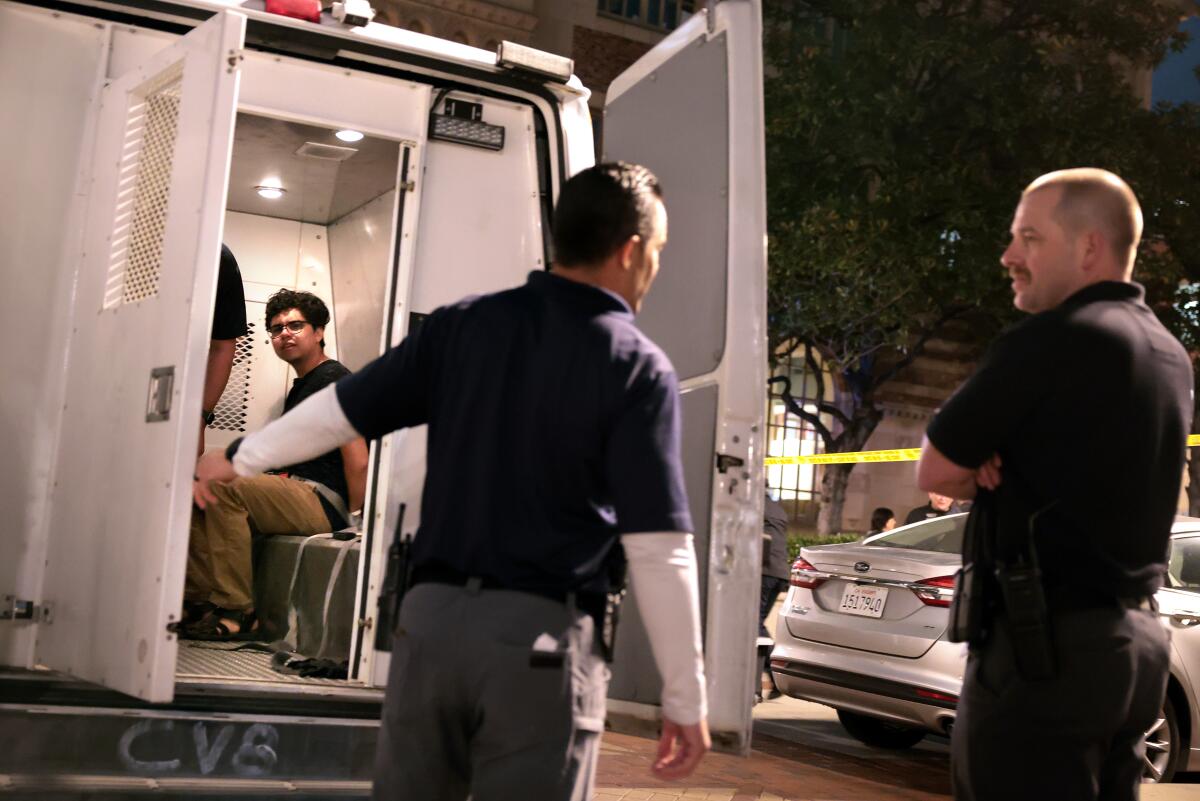
Protesters are held in an LAPD van after being arrested on campus Wednesday.
(Wally Skalij / Los Angeles Times)
The president did not discuss the speech cancellation.
Across the country, pro-Palestinian activists at colleges and universities were mounting encampments, modeled after one at Columbia University. More than 50 tents went up at UC Berkeley, while Cal Poly Humboldt closed its campus after pro-Palestinian activists barricaded themselves in university buildings.
USC activists, newly energized and angered over Tabassum, raised tents before sunrise on Wednesday. By morning, they hung “Free Palestine” and “Liberated Zone” banners and posters across Alumni Park, the traditional site of the “main stage” graduation ceremony.
Campus security told the growing crowd that tents and signs on trees were not allowed and that microphones were banned. Some scuffles ensued as USC security officers attempted to dismantle the encampment before relenting under pressure from crowds chanting “shame.”
LAPD helicopters circled above. USC shut off public access to campus. Guzman, the provost, told academic deans that professors could move classes online.
LAPD officers in riot gear staged outside the gates. Shortly after 5 p.m., dozens of officers marched onto campus, and an hours-long standoff with protesters began. By the evening, police had arrested 93 people, many of them students, and moved the remaining crowd off campus.
Nguyen, the professor, was among the protesters. “These were students with direct demands. They want the divestment from ties to a genocide,” he said — a reference to investments in weapons companies with ties to the war in Gaza.
USC has not said whether it has those kinds of investments. Experts on endowments say that universities typically have such financial ties through endowment portfolios. In a statement last year on academic boycotts of Israel, another demand of protesters, USC said it rejected them “on the grounds that a robust intellectual environment requires the free and civil exchange of ideas.”
Many Jewish groups have called the divestment movement antisemitic, saying it aims to isolate and de-legitimatize the Jewish homeland.
By Thursday morning, the USC campus was calm. Staff cleared remaining tents from Alumni Park and installed white fencing for an annual graduate brunch.
In another area, Jewish students set up long tables for a Passover Seder that featured photos of hostages who are believed to still remain in Gaza after the Oct. 7 Hamas attack on Israel, which killed 1,200 people and took roughly 240 hostages. Israel’s retaliatory war has killed more than 34,000 Palestinians, according to Gaza health authorities, and the United Nations says roughly 2 million Gazans are living in near-famine conditions.
Folt tried privately to cool the tensions.
Following an earlier call with a member of the Advisory Committee on Muslim Life, she wrote back to the resigned members, saying she hoped they’d reconsider but respected their decision, the members said this week at a news conference. The same day, she called the campus Chabad Rabbi, Dov Wagner, offering her support for the Jewish community, the rabbi said in an interview.
Midday Thursday, a message went up on the USC website. The “main stage” commencement was canceled entirely, because new security measures would not allow for the processing of a large number of guests, the message said. More than two dozen satellite commencements for individual colleges and schools would continue. But there would be new security checks — X-rays and metal detectors — and an eight-ticket maximum per graduating student.
A graduating senior went viral on TikTok with her displeasure. Parents called, worried that they wouldn’t be able to bring large families to celebrate.
“What they did was rob these students, many who did not have a traditional graduation in 2020 because of COVID, of yet another graduation,” said Devin Griffiths, an associate professor of English and comparative literature. “We have brought up students to believe they should be forthright, engaged citizens who talk openly about their beliefs and disagreements. Instead, we close commencement and send them to jail.”
Student activists were not deterred. They staged a die-in at Founders Park.
“Disclose! Divest! We will not stop! We will not rest,” students shouted.
The Founders Park protest continued through Friday afternoon, when Folt released her campus letter to students, faculty, staff and alumni.
“This week, Alumni Park became unsafe. No one wants to have people arrested on their campus. Ever,” she wrote. “But, when long-standing safety policies are flagrantly violated, buildings vandalized, [Department of Public Safety] directives repeatedly ignored, threatening language shouted, people assaulted, and access to critical academic buildings blocked, we must act immediately to protect our community.”
A university-wide email then went out, announcing that unregistered guests would remain blocked from entering the typically open campus through May 8.
It also said that “no social events” were allowed during the period that included the end-of-year “study days” and final exams. The rule is written in the student handbook but rarely enforced. The email suggested that additional protesting would not be tolerated, saying that no “disruptive activities may take place.”
On Friday evening, the LAPD and campus security were present at the protest. And the tents, cleared out earlier, had returned.
Times staff writer Jenna Peterson contributed to this report.
Source link



























